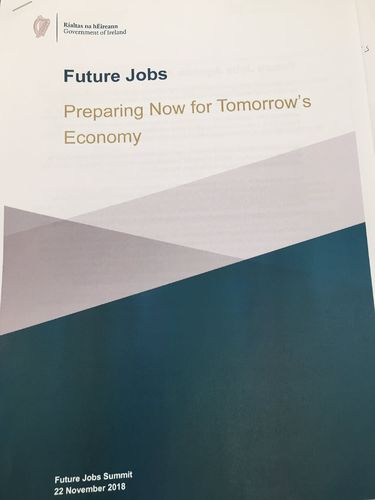In late November, 2018 the Department of An Taoiseach and the Department of Business, Enterprise and Innovation organised the Future Jobs Summit. They envisaged this event feeding into the development of Future Jobs 2019, which will be produced instead of an Action Plan for Jobs, a process that ran from 2012 to 2018.
An Taoiseach Leo Varadkar, T.D. opened the Summit and noted that “Future Jobs will focus on environmentally and economically sustainable productive, quality jobs in flexible family friendly workplaces.” The second speaker, Luiz de Mello from the OECD, spoke on
Ireland’s Productivity Challenge and said that “Ireland is also lagging behind its European neighbours in terms of management skills and life-long learning. This lag has required industry to adopt new digital technologies to offset any skill mismatch.” Julie Spillane from Accenture was the next speaker and she focused on Ireland's Future Economy, noting that “Ireland should focus on inclusivity and creating a motivated and empowered workforce starting with the individual and a ‘growth mindset’. Government’s role should be towards a more human-centric approach.”
In her speech welcoming people to the Summit, Minister for Business, Enterprise and Innovation, Heather Humphreys T.D. said “Although we are nearly at full employment, there is scope to increase participation. We need to ensure that we have an all-inclusive workforce and remove any barrier stopping people from returning to work.”
Future Jobs will be organised around five pillars, and the six thematic workshops at the Summit reflected them, including:
- Improving productivity, particularly in Irish SMEs;
- Innovation and technological change;
- Enhancing skills and developing and attracting talent;
- Increasing participation in the labour force; and
- Transitioning to a low carbon economy.
The INOU participated in the workshop focusing on ‘increasing participation in the labour force’, and more time to engage in and deliberate on this issue would have been welcome. The points highlighted in the short summary of this workshop do not fully capture the discussion. In particular, the challenges raised facing people because of their ethnicity, including Travellers; age; gender; socio-economic status; and disability.
It is welcome that in his closing remarks, Minister for Finance, Public Expenditure and Reform, Paschal Donohoe, T.D. said “Employment levels will have to be maintained to ensure that our economy moves forward, but current participation levels are lower than they have been in the past. Measures that encourage increased participation from segments of society that have previously been under-represented in the workforce will need to be introduced.”
For further information follow this link:
https://dbei.gov.ie/en/What-We-Do/Business-Sectoral-Initiatives/Future-Jobs/
